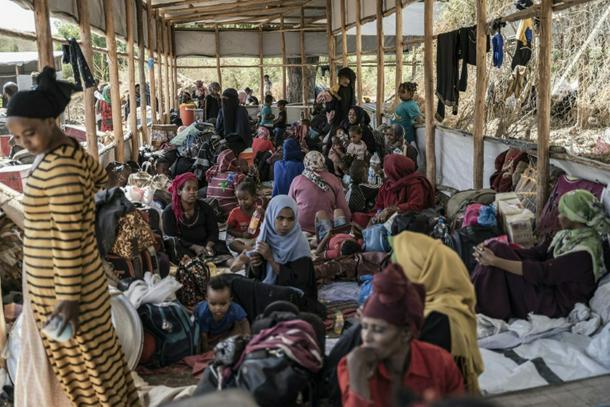
Children are also heavily represented among those fleeing Sudan, according to the United Nations
Geneva (AFP) - Some 200,000 people have now fled Sudan to escape fighting that erupted in mid-April, the UN said Friday, also warning a factory producing life-saving treatments for malnourished children had burned down.
“As violence in Sudan continues for a fourth week, nearly 200,000 refugees and returnees have been forced to flee the country, with more crossing borders daily seeking safety,” UN refugee agency spokeswoman Olga Sarrado told reporters in Geneva.
Another 700,000 people have also been displaced within Sudan since the fighting erupted on April 15, the UN’s migration agency said earlier this week.
Nearly one month after the outbreak of the fighting that has killed more than 750 people and displaced hundreds of thousands, the two sides signed the agreement late Thursday during talks in the Saudi city of Jeddah.
They have not yet agreed to a ceasefire in the thorny talks, but they did vow to protect civilians, and committed to let in badly needed humanitarian assistance after looting and attacks targeting aid in the impoverished country.
UN’s Sudan envoy, Volker Perthes, said the agreement was important since it marked “a mutual commitment”, even if it was only to adhere to international laws they should have been following anyway.
“I think it is a first step, it is an important first step,” he told reporters in Geneva via video link from Port Sudan, hailing in particular that the sides had committed “continue talks” under US and Saudi mediation.
“We expect these talks on ceasefire to start off again from today or from tomorrow.”
- Children at risk -
Nothing looked set to change immediately however, and forces of two rival generals again exchanged fire in Khartoum Friday.
The UN children’s agency UNICEF warned that a factory in the Sudanese capital producing therapeutic food to counter malnourishment had burned down, destroying life-saving treatments for 14,500 children.
“This is the darkest, most distinct illustration to date of how this conflict threatens the lives of children through multiple means,” UNICEF spokesman James Elder told reporters in Geneva.
Children are also heavily represented among those fleeing Sudan, Sarrado said.
For neighbouring Chad, she said some 30,000 refugees had arrived in just recent days, bringing the total number who have arrived from Sudan in recent weeks to 60,000.
“Almost 90 percent of refugees are children and women, including many pregnant women,” she said.
A full 20 percent of children between the ages of six months and five years had been found to be acutely malnourished.
In all the countries people are fleeing to, “the humanitarian response is challenging and costly,” Sarrado said.
“Refugees and returnees are arriving in remote border areas where services and infrastructure are scarce or non-existent and the host population was already suffering due to climate change and food scarcity.”
“The coming rainy season will make logistics even harder as many roads will become impassable,” she added.